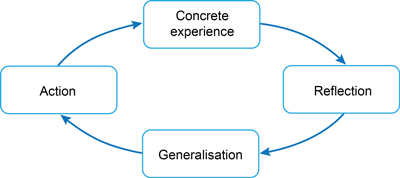5.1 Kolb’s cycle of learning
The educational theorist David Kolb (1976) developed a theory of learning in which he argued that learning from experience necessarily involves four stages, shown in Figure 6, and that each of these stages draws on different skills and characteristics.
The different elements include:
- Concrete experience – an actual experience, situation or sequence of events. What happened? Who was involved? The experience or event is usually something that you feel could have been handled differently.
- Reflection – thinking about why something happened and how it happened.
- Generalisation – what was the impact of this event?
- Action – how to change our future behaviours – what will you do differently?
So the cycle shows that learning from experience is about more than just acquiring experience (concrete experience) and thinking about what happened (reflection). It means developing a more general understanding that can be applied to other situations (generalisation) and finding ways to try out this new learning (action). Kolb argued that in practice, most of us are stronger in one or more of the stages of the cycle than in others and that this presents challenges to people who want to learn effectively from experience (Kolb, 1976).
Kolb’s cycle gets you to consider the action you have taken as well as the consequences, and consider what might have been done differently. In doing so you create knowledge that is new to you and which you can apply in future situations. In the process, you learn more about your own thinking, which enables you to improve it. For example, you might recognise that you had knowledge that you didn’t apply or that you needed more knowledge or information, or that your feelings, personal beliefs or expectations influenced your thinking without you realising it. Thus, the next time you act you are much less likely to repeat past mistakes or oversights.
Activity 9 Applying the learning cycle
Identify a difficult work, volunteering or life situation you have experienced. Now make notes on it using the different elements of Kolb’s learning cycle.
Comment
Hopefully this will have given you a sense of what you learned from the event and how you might act differently if a similar situation arises in the future.

